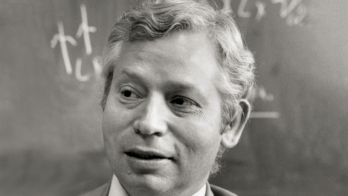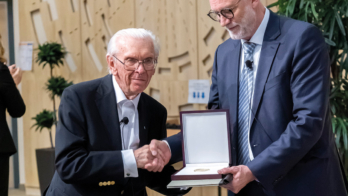
Director-general of the ITER Organization, Bernard Bigot, passed away on 14 May, aged 72. An inspirational leader for more than four decades across multiple fields of science and energy, his personal dedication and commitment to ITER over the past seven years shaped every aspect of the project. While his untimely passing will be felt as a tragic blow to the global fusion community, Bigot’s careful design and preparation of the ITER senior management team in recent years gives reassurance for the project’s continued success.
Bigot took the helm at ITER in March 2015 at a critical point in the project’s history, when it was experiencing significant difficulties reflecting the managerial challenges inherent in both its complex engineering and its multinational approach to design, manufacturing and construction. He accepted these challenges with humility and unwavering resolve, proposing a multifaceted plan that transformed the project’s culture. Today, ITER is more than 75% complete and stands as a monumental example of scientific and engineering prowess, and a testimony to the merits of international collaboration.
Trained as a physical chemist at the École normale supérieure, with a PhD in chemistry, Bigot had a deep understanding of the challenges that went with mastering hydrogen fusion. He was a high-ranking university professor at the École normale supérieure de Lyon, which he helped to establish and then directed for several years. The author of more than 70 publications in theoretical chemistry, Bigot was also in charge of research at the École normale supérieure, director of the Institut de recherche sur la catalyse (a CNRS laboratory specialising in catalysis research) and president of the Maison de la Chimie foundation.
The experience he acquired at the highest levels of the scientific and research establishment – as private secretary to ministers, high commissioner for atomic energy, chairman and CEO of the CEA, and as such the principal interface between France and ITER between 2008 and 2015 – had prepared him for the daunting task of leading a 35-nation, long-term endeavour, as unique in its goals as it is in its organisation and governance. However, the uniqueness of ITER required more than experience in science, the management of large institutions and the oversight of complex construction projects. ITER – particularly at the time Bigot took over – also demanded political finesse and diplomatic subtlety, qualities that he had in abundance. Always ready to exchange with media representatives, politicians, economists, VIPs or general visitors, he knew how to make complex subjects understandable and meaningful.
He received numerous awards, including his status as a Commander in the French Order of the Legion of Honour, a Commander in the Royal Swedish Order of the Polar Star, an Officer of the French Order of the National Merit, the holder of the Gold and Silver Star in the Japanese Order of the Rising Sun, and the recipient of the China Friendship Award. Beyond these achievements and accolades, he will be remembered as a visionary leader, intensely focused on the enhancement of global society and the desire to leave the world a better place. The greatest honour we can pay is to continue delivering the ITER project with the same unwavering commitment and dedication that he demonstrated to all of us.
Bernard Bigot was a man of duty and service, who placed loyalty above all virtues, a deeply human leader, as demanding of others as he was of himself. He will be deeply missed.





